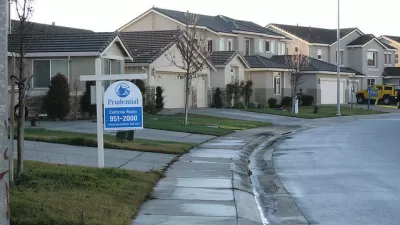In this excerpt from his forthcoming book, Subprime Solution, economist Robert J. Shiller writes of our tendency to succumb to "bubble thinking," and the role this has played in the current mortgage crisis.
"Many culprits have been fingered for the housing crisis we're in today: unscrupulous mortgage lenders, dishonest borrowers, underregulated financial institutions. And all of them played a role. But too little attention has been paid to the most fundamental cause: the contagious optimism, seemingly impervious to facts, that often takes hold when prices are rising. Bubbles are primarily social phenomena; until we understand and address the psychology that fuels them, they're going to keep forming. And unless we apply that understanding to the bubble we're trying to recover from, we risk calamity.
Speculative bubbles are fueled by the social contagion of boom thinking, encouraged by rising prices. Sooner or later, some factor boosts the transmission rate high enough above the removal rate for an optimistic view of the market to become widespread. Arguments that this boom is unlike past bubbles-I call them "new era" stories-become more prominent and seemingly credible.
Few people seem immune to boom thinking. The recent bubble grew so large partly because the very people responsible for the financial system's oversight came to share the general public's rosy expectations. They may not have believed as fervently in the boom, but they still accepted the idea that it would not end badly. Builders kept building, and ratings agencies did not temper their sunny assessments of mortgage securities until after the crisis had begun. In October 2006, Frank Nothaft, the chief economist at Freddie Mac, a major securitizer of home mortgages, told me that Freddie Mac had financially modeled the impact of a price decline of up to 13.4 percent. When I asked him about the possibility of a bigger drop, he replied that such a drop had never happened (at least not since the Great Depression)-and he seemed unable to imagine that it could.
If home prices keep dropping, more bailouts of banks and broker-dealers likely will be necessary to prevent the paralysis of the financial system and a severe loss of confidence in our economy and economic institutions. And if we aim to stop foreclosures, with all their ugly consequences, from spreading further, many, many homeowners are going to need loan refinancing-which will need to be provided or backed by the government."
FULL STORY: Infectious Exuberance

Maui's Vacation Rental Debate Turns Ugly
Verbal attacks, misinformation campaigns and fistfights plague a high-stakes debate to convert thousands of vacation rentals into long-term housing.

Planetizen Federal Action Tracker
A weekly monitor of how Trump’s orders and actions are impacting planners and planning in America.

In Urban Planning, AI Prompting Could be the New Design Thinking
Creativity has long been key to great urban design. What if we see AI as our new creative partner?

King County Supportive Housing Program Offers Hope for Unhoused Residents
The county is taking a ‘Housing First’ approach that prioritizes getting people into housing, then offering wraparound supportive services.

Researchers Use AI to Get Clearer Picture of US Housing
Analysts are using artificial intelligence to supercharge their research by allowing them to comb through data faster. Though these AI tools can be error prone, they save time and housing researchers are optimistic about the future.

Making Shared Micromobility More Inclusive
Cities and shared mobility system operators can do more to include people with disabilities in planning and operations, per a new report.
Urban Design for Planners 1: Software Tools
This six-course series explores essential urban design concepts using open source software and equips planners with the tools they need to participate fully in the urban design process.
Planning for Universal Design
Learn the tools for implementing Universal Design in planning regulations.
planning NEXT
Appalachian Highlands Housing Partners
Mpact (founded as Rail~Volution)
City of Camden Redevelopment Agency
City of Astoria
City of Portland
City of Laramie



























